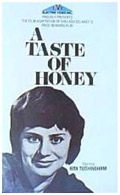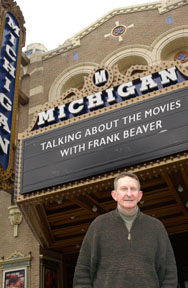
This web page is part of the Michigan Today Archive. To see this story in its original context, click here.
Talking About the Movies: Angry Young Men and Kitchen Sink Realism
I've been fortunate to teach in the University of Michigan's London Study Abroad program and have become especially fond of British film in all its wonderful variations: the Alexander Korda period fare, Hitchcockian suspense, David Lean epics, Olivier's Shakespearean renderings and the Ealing Studio black comedies. So I want to make special note of the fact that 2006 is the 50th anniversary of the onset of one of British cinema's most interesting periods of filmmaking.
In 1956, John Osborne's play Look Back in Anger premiered at London's Royal Court Theatre. The drama's central character, Johnny Porter, railed against the upper class and society in general. In one particularly memorable outburst Porter screamed: "I may write a book about us all…. And it won't be recollected in tranquility either, picking daffodils with Auntie Wordsworth. It'll be recollected in fire and blood. My blood." The revolutionary tone of such dialogue signaled a thematic restlessness that would lead to the Angry Young Men movement in theater and, shortly afterwards, to the Kitchen Sink Realism movement in British cinema. At the same time that Look Back in Anger was playing before startled audiences at the Royal Court, a group of British filmmakers launched their own innovative work at the National Film Theatre (NTF) and presented six programs between 1956 and 1959. Most of the works were short documentaries that focused on the realities of life for working class people in contemporary Britain—Everyday but Sunday (fruit and flower farmers of Covent Garden), We Are the Lambeth Boys (teenagers in London's outer suburbs), and Mama Don't Allow (youthful patrons of a North London jazz club), are outstanding examples. The NTF's film enterprise was known as the Free Cinema movement. Among its filmmakers were Karel Reisz and Lindsay Anderson. Both of whom became acclaimed directors who carried forward into their feature films the class-conscious interests of Free Cinema. In 1960, Reisz adapted Alan Sillitoe's 1958 novel Saturday Night and Sunday Morning into a film of considerable importance because of its Midlands' view of working class life. Anderson's If…. (1969) presented a free-form satire on life in a British public (that is, private) boarding school.
The term "kitchen sink realism" surfaced as a result of the cluttered, drab settings and somber imagery that characterized the screen version of Look Back in Anger (1958), A Taste of Honey (1961) and The Loneliness of the Long Distance Runner (1962), all directed by Tony Richardson. Other directors who embraced the social-realist movement included Jack Clayton (Room at the Top, 1958) and John Schlesinger (A Kind of Loving, 1962). As with Italian neo-realism of the 1940s and '50s, the intensity of the angry young men and kitchen sink realism movements began to fade a decade after their emergence. If Federico Fellini's La Dolce Vita (1960) gave indication of a stylistic and thematic about-face from Italian neo-realism, then Schlesinger's Darling (1965) can be seen as a similar transitional moment for British cinema. Julie Christie's Diana Scott—a London-based model—is a character of unwavering ambition, willing to use all available means to attain her career and personal goals. The film's existential styling and amoral feel offered a decided departure from working class themes and a shift toward personal, psychological explorations of British character. If one is interested in visiting (or revisiting) this fascinating phase of filmmaking, I'd recommend a three-unit approach. Begin with The Loneliness of the Long Distance Runner. You'll experience the anger and consequences born of class awareness and see the drab imagery of kitchen sink realism. Afterwards have a look at If….. Anderson's enigmatic boys-school film stars a young Malcolm McDowell as the in-house rebel. Then watch Darling, a "dolce vita" film with Christie in one of the screen's greatest-ever performances. I think you'll see why I find British cinema so interesting and so provocative.
|
|
Michigan Today News-e is a monthly electronic publication for alumni and friends. |
| MToday NewsE | |
|
|
Michigan Today
online alumni magazine
University Record
faculty & staff newspaper
MGoBlue
athletics
News Service
U-M news
Photo Services
U-M photography
University of Michigan
gateway



